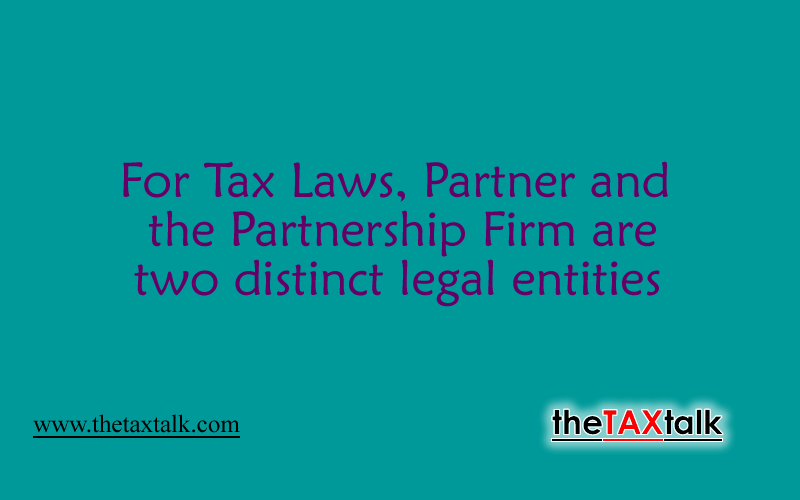![]()
For Tax Laws, Partner and the Partnership Firm are two distinct legal entities
| Delhi High Court in the case of Commissioner Of Income Tax vs Nagpur Golden Transport Co. (1998) 233 ITR 389 Delhi has categorically held as under:
1. The scheme of the Income Tax Act, 1961 provides that that the firm and its partners are treated as two separate legal entities so far as the provisions of tax law are concerned. 2. While framing an order of assessment under the provisions of the IT Act, 1961, the firm and its partners are to be treated as two separate legal entities. 3. Payment of interest to a firm cannot be treated in the tax law as payment of interest to its partners.
Here is a copy of the Complete Judgment delivered by the Honorable Bench of Delhi High Court.
Delhi High Court Commissioner Of Income Tax vs Nagpur Golden Transport Co. Dated- 1 December, 1997 Equivalent citations: 1998 233 ITR 389 Delhi
JUDGMENT R.C. Lahoti, J.
1. This is a reference under s. 256(1) of the IT Act, 1961, made at the instance of the Revenue seeking the opinion of the High Court on the following two questions of law arising out of the asst. yr. 1965-66 : “1. Whether, on the facts and circumstances of the case, the Tribunal was correct in law in allowing depreciation on trucks purchased by the assessee on hire-purchase basis? 2. Whether, on the facts and in the circumstances of the case, the Tribunal was correct in law in allowing interest paid to partners amounting to Rs. 2,859 ?” 2. So far as question No. 1 is concerned, the same stands concluded by a Division Bench decision of this Court in Addl. CIT vs. General Industries Corporation (1985) 155 ITR 430 (Del) : TC 27R.306 wherein the view taken by the Court is that depreciation is to be allowed to the user in the case of a hire-purchase agreement. The Tribunal, therefore, was right in allowing depreciation on trucks purchased by the assessee on hire-purchase basis. 3. So far as question No. 2 is concerned, the assessee-firm has paid interest to the firm, Laxmi Chand Jiwan Dass. The controversy arose because the partners in the firm, Laxmi Chand Dewan Das, were the same as were in the assessee-firm, that is to say, the partners in the two firms were common. The ITO had formed an opinion that the payment of interest by one firm to the other was a payment to the partners of the firm in as much as the partners in the two firms were common, attracting the applicability of s. 40(b) which has an overriding effect on the provisions of s. 36 of the Act. However, the Tribunal has formed an opinion that payment of interest to another firm could not be treated as payment of interest to the partners of that firm within the meaning of s. 40(b) though the partners in the two firms were common. 4. Having heard learned counsel for the Revenue, we are of the opinion that the Tribunal has not erred in taking the view of the law which it has done. The scheme of the IT Act, 1961, shows that the firm and its partners are treated as two separate legal entities so far as the provisions of tax law are concerned. While framing an order of assessment under the provisions of the IT Act, 1961, the firm and its partners are to be treated as two separate legal entities and payment of interest to a firm cannot be treated in the tax law as payment of interest to its partners. 5. For the foregoing reasons, both the questions are answered in the affirmative, i.e., in favour of the assessee and against the Revenue.
|

